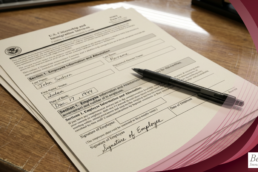If a company has been acquired, merged or had a significant change in its ownership, this may have an impact on a foreign national’s PERM application. If the legal entity of the employer changes while the PERM application is pending with DOL, the application may become invalid unless the new company meets several criteria to qualify as a “Successor in Interest” (SII).
How will SII affect an I-140?
When a merger or acquisition happens after a PERM has been filed, an employer must be prepared to satisfy the successor in interest requirements to U.S. Citizenship and Immigration Services (USCIS) when submitting an I-140 petition. USCIS will allow SII employers to use the original company’s approved labor certification when filing an I-140 for the beneficiary named on the PERM, along with evidence that the new petitioner meets the SII criteria.
How does USCIS determines if an employer is an SII employer?
To determine whether a company is an SII employer that can use the original employer’s approved labor certification, USCIS looks at three factors:
- Same Job Opportunity: The job opportunity offered by the SII employer must be the same as the job opportunity originally offered on the labor certification. USCIS will examine the job duties, title changes, wage increases, and other changes of the position to see if the job is still the same. A geographic change to the proposed employment or other material change in the job opportunity covered by the original labor certification will be problematic.
- Assumption of Ownership: For a valid SII relationship to exist, the petitioner must fully describe and document how the SII employer assumed ownership of the original company noted on the PERM. For acquisitions made through stock purchase agreements, this is generally a straightforward process. Asset purchase acquisitions and merger acquisitions can be more complex, as the legal entity may or may not be preserved. If the new or merged company took on all the assets (accounts receivable, intellectual property rights, contract rights, etc.) and all the liabilities (accounts payable, debts, contract obligations, etc.) in the merger or buyout, then the new or merged company is generally considered the successor in interest of the original company. These situations can be very complex and require thorough examination and extensive documentary evidence.
- Burden of Proof: The SII employer has the burden of proof to establish eligibility. They must provide evidence from the original company, such as ability to pay the offered wage from the date it filed the labor certification until the date of the SII event.
Note that if the foreign national’s priority date is current and their Adjustment of Status Application has been filed and pending for more than 180 days, the green card process does not need to be restarted, regardless of whether or not a SII situation exists.
If you have any questions about how a recent company merger may affect your PERM or I-140, please contact us at Berardi Immigration Law!
Ready to have Berardi on your side?
Whether you’re a business looking to hire or a professional hoping to relocate, immigration law can be complicated. But you don’t have to do it alone. Put our experience to work for you.



